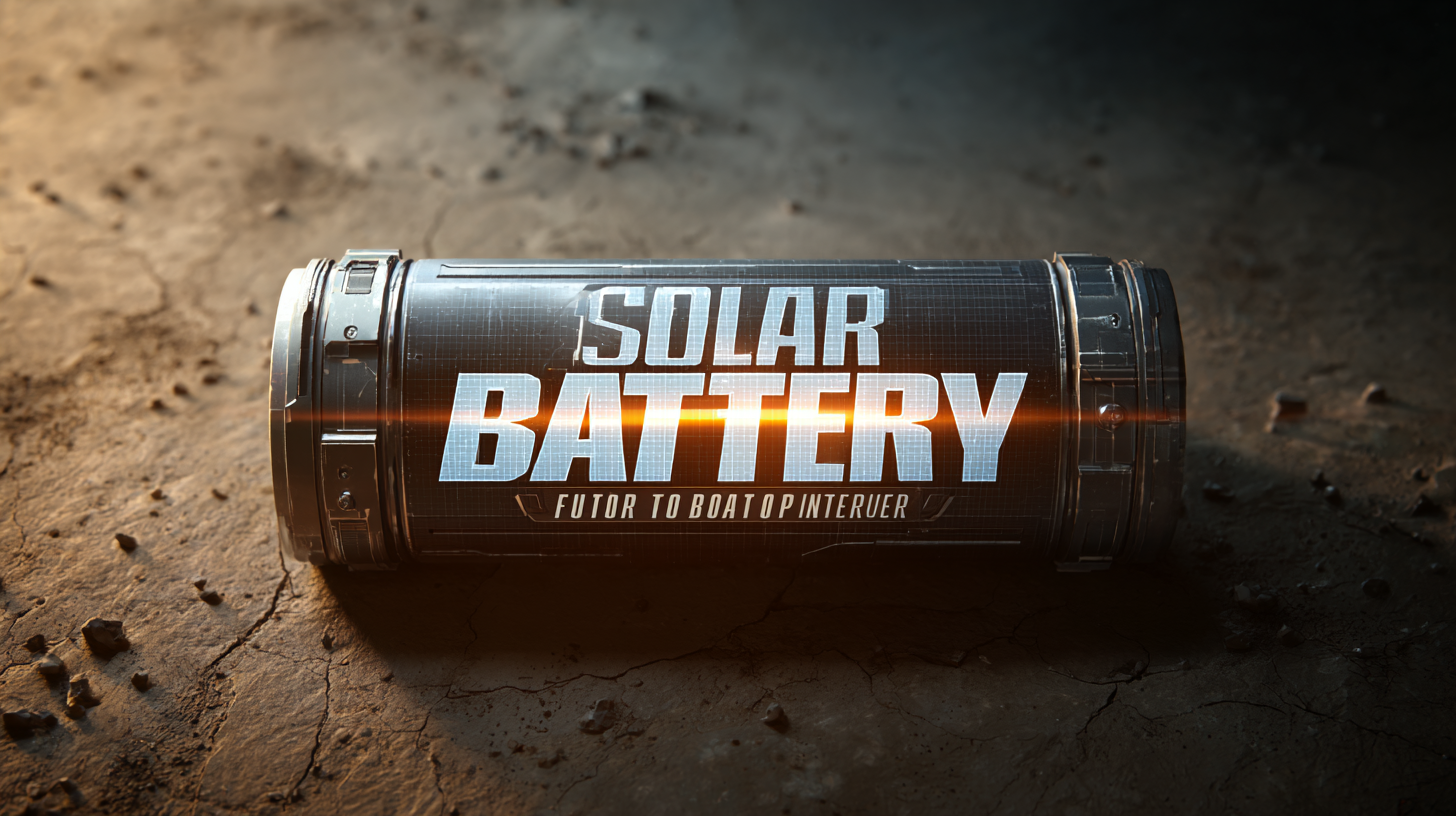Future of Solar Battery Market by 2025 and How to Choose the Best Option for Your Needs
As the world moves toward a more sustainable future, the solar battery market is expected to experience significant growth, with projections indicating it could reach a value of over $20 billion by 2025. With increasing demand for renewable energy sources and advancements in battery technology, solar batteries are becoming essential for optimizing solar energy use in residential and commercial applications. According to a recent report by Allied Market Research, the global solar battery market is anticipated to grow at a compound annual growth rate (CAGR) of 20.3% from 2019 to 2026. This surge highlights the importance of selecting the right solar battery to meet individual needs, as consumers will face a myriad of choices, from different capacities to innovative technologies. In this article, we will explore the future of the solar battery market and provide actionable tips for choosing the best solar battery that aligns with your specific energy requirements.

Trends Shaping the Solar Battery Market by 2025
The solar battery market is poised for significant evolution by 2025, driven by several key trends. According to a report by Grand View Research, the global solar battery market is expected to grow at a compound annual growth rate (CAGR) of over 20% from 2022 to 2025. This surge is largely attributed to increased demand for renewable energy solutions and growing consumer awareness of energy independence. The advent of advanced lithium-ion batteries, which offer higher energy density and longer life cycles, is enabling more homeowners and businesses to integrate solar energy into their power solutions more feasibly.
Furthermore, government incentives and decreasing costs associated with solar battery technology are accelerating adoption rates. The International Energy Agency (IEA) projects that energy storage capacity, including solar batteries, could expand to 600 GWh globally by 2025 due to technological advancements and policy support. As consumers navigate the array of options available in the market, understanding their specific energy needs and budget constraints will be crucial in choosing the right solar battery system. Factors such as compatibility with existing solar panels, warranty length, and the type of battery chemistry employed will play significant roles in decision-making and long-term satisfaction.
Future of Solar Battery Market by 2025
Key Factors Influencing Solar Battery Performance and Longevity
When considering a solar battery for your energy needs, several key factors play a crucial role in determining its performance and longevity. First and foremost, the chemistry of the battery significantly influences its efficiency and lifespan. Lithium-ion batteries are the most popular choice due to their high energy density and longer cycle life compared to lead-acid batteries. Understanding the differences in battery chemistry helps you select an option that aligns with your usage patterns and energy requirements.

Another critical factor is the depth of discharge (DoD) and cycle life of the battery. The DoD indicates how much of the battery's capacity can be utilized before recharging, while cycle life refers to the number of charge and discharge cycles a battery can undergo before its performance declines. Opting for a battery with a higher DoD allows for more energy usage without compromising its lifespan, making it an essential consideration for homeowners looking to maximize efficiency. Additionally, temperature tolerance and warranty offerings also contribute to long-term performance, ensuring that your investment is protected as the technology continues to evolve.
Evaluating Solar Battery Certifications: What You Need to Know
When considering solar batteries for your renewable energy system, understanding certifications is crucial to ensure safety, performance, and reliability. Various organizations provide certifications that indicate a battery's compliance with industry standards. For instance, UL (Underwriters Laboratories) certification denotes that a product has undergone rigorous testing for safety, while IEEE (Institute of Electrical and Electronics Engineers) certifications ensure that batteries meet specific performance and interoperability requirements. Familiarizing yourself with these certifications can help you discern quality products from subpar options.
In addition to safety certifications, it’s important to look for warranties and performance guarantees, which often reflect the manufacturer's confidence in their product. Brands that offer comprehensive warranties usually stand behind their technology, ensuring longevity and efficiency.
Furthermore, consider certifications specific to energy storage systems, such as the Energy Star label, which identifies battery systems that meet energy efficiency criteria. By paying attention to these certifications, you can make an informed choice that aligns with your energy needs and expands the utility of your solar investment.
How to Assess Your Energy Needs Before Choosing a Solar Battery
When considering the best solar battery for your energy needs, the first step is to thoroughly assess your consumption patterns. Start by analyzing your monthly electricity bills to determine your average usage. Take note of peak usage times—understanding when you consume the most energy can help you gauge the capacity required from your solar battery. Additionally, consider any future changes in your energy needs, such as home expansions or the addition of electric vehicles, which could increase your overall consumption.

Next, evaluate the efficiency and lifespan of potential solar batteries. Look for batteries with a high round-trip efficiency, as this indicates how much of the stored energy is usable after charging and discharging. It's also important to consider warranty periods and the expected lifespan of the battery. Investing in a battery that lasts longer will save you money in the long run and improve your energy independence.
By carefully analyzing your energy requirements and the specifications of available solar battery options, you can make an informed decision that aligns with your lifestyle and sustainability goals.
Comparative Analysis of Leading Solar Battery Brands and Technologies
When exploring the solar battery market, it’s vital to consider the leading brands and their technologies for a well-informed choice. Brands like Tesla, LG Chem, and Sonnen offer diverse options when it comes to energy storage systems. Tesla's Powerwall, known for its sleek design and smart technology, allows for efficient energy management. In contrast, LG Chem provides modular solutions that cater to various energy needs, making it highly customizable. Sonnen focuses on community energy sharing, promoting sustainability and collaboration among users.
When selecting the right solar battery, here are a few tips to consider: First, assess your energy consumption to determine the necessary storage capacity. Monitor your monthly energy usage and peak times to get a clear picture of your requirements. Second, evaluate the battery's efficiency and lifespan, which can significantly impact long-term savings and environmental footprint. Lastly, take into account the warranty and customer service offered by the manufacturer, as strong support can be crucial for maintenance and troubleshooting in the future.
